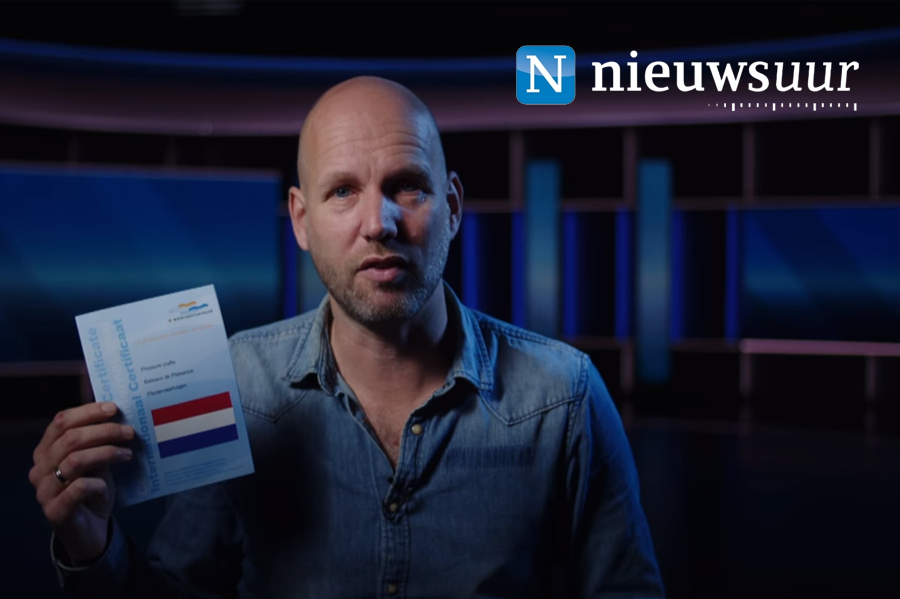Nieuwsuur, a highly respected news programme on the Dutch public TV network NOS, aired a documentary about the ICP on 28 and 29 October 2020.
The International Certificate of Pleasure Crafts (ICP) is issued by the Koninklijk Nederlands Watersport Verbond (Royal Netherlands Watersportfederation). Together with the Koninklijke Nederlandsche Motorboot Club (Royal Netherlands Motorboat Club, they have been appointed by the Netherlands Ministry of Infrastructure and Water Management to issue and manage ICP registrations. It is the ministry who determines how ICP’s are issued and what the criteria are to apply for an ICP.
What is an ICP
The ICP is an unofficial document stating the ownership of a vessel. There is one big but, and that is that the document explicitly mentions that the holder may not sail under the Dutch flag and it does not give the vessel the Dutch nationality, as it does with a formal registration in the official ships registrar. In fact a vessel with an ICP is nationless.
The problem
In 2019 Portugal banned the ICP altogether and just before the summer months the Guardia di Finanza, an Italian law enforcement agency under the authority of the Minister of Economy and Finance, confiscated a number of boats in Italy that were sailing with an ICP. Not only Italian owned boats with an ICP, but also Dutch owned boats.
Non-Italians with an ICP were chained and forced to register their vessel in an official ships registrar, as nationless boats are not permitted to navigate Italian waters, unless the boats measures less than 10m.
Following the documentary Spain also stated to no longer accept ICP as a form of proving the ownership of a vessel.
Tax evasion and the ICP
The Guardia di Finanza, was keen on checking yachts sailing under the Dutch flag, as Italians with an ICP registered their boat outside of Italy in order to escape from tax obligations. Italians to have had their yacht confiscated and were pressured to either register in Italy or in another official ships registrar, which in all cases is more expensive than an ICP.
In the documentary one of the larger Dutch sellers of ICP’s was confronted with the fact that his company was listed in an internal document of the Guardia di Finanza, the exact context of why the company was mentioned in an internal document was however not clear.
Criminal abuse of the ICP
In the month September the Spanish authorities confiscated 35 ton of hasj, which was transported on yachts. Of the five pleasure crafts caught, two had an ICP. MAOC, a European anti-drug unit based in Portugal, stated that the ICP is being used by criminal organisations to register their yachts in which they transport drugs.
What was surprising is that neither MOAC nor Dutch police forces communicated this with the Watersportverbond. That way the Watersportverbond was not given the opportunity to follow the trail to where these ICP’s were originally ordered.
The ICP and non-EU residents
For non-European residents and passport holders a common approach to register their yacht in Europe is establishing a company in an EU state and making the company owner of the vessel, if they want to register their yacht in a European flag state.
This is not only done with ICP’s but also in official ships registrars. In principle there is nothing wrong with this approach. For example it is not uncommon that an American or Canadian passport holders purchases a yacht in Europe, pay VAT and navigates the Mediterranean during the summer season.
Would they not have the possibility of flagging their boat in the EU, it would mean they would have to register the boat outside of the EU. When they want to sell the boat in the EU, the boat would have to be imported and VAT would have to be paid again. Not an attractive option which would negatively affect yacht sales within the EU.
It goes without saying that this construction of setting-up a company and registering the boat under the name of the company can be abused. Just as marrying an EU citizen in order to get a permanent resident permit or to get an EU passport.
Watersportverbond was “accused” for accepting boats registered to a companies owned by non-EU citizens, as if it was a criminal offense, which in facto is not the case if the company or vessel is not used for criminal or shady activities.
Changes may be expected
Without a doubt changes may be expected. During the live broadcast of the documentary, it was reported that possible changes could be that more strict guidelines will be imposed in order to be able to apply for an ICP or possibly that only Dutch citizens and passport holders are eligible for an ICP. The Watersportverbond already announced that as from 1-1-2021 new application criteria will be put into place.
What was not mentioned in the documentary
A bit of a shame was that no mention was made that the ICP was originally developed for European yacht owner to navigate the internal- and coastal waters of the EU and that it was ratified as such by Austria, Belgium, Croatia, Czech Republic, France, Germany, Hungry, Lithuania, Luxemburg, Romania, Serbia, Slovakia and the United Kingdom.
The ICP is therefore accepted in all these countries and in a number of other European countries accept it, although they have not formalised so as the other states have.
The TV documentary
The TV documentary is in Dutch and worth viewing. YouTube does offers subtitling in your own language, just to make your life a bit easier if you do master the Dutch language.


